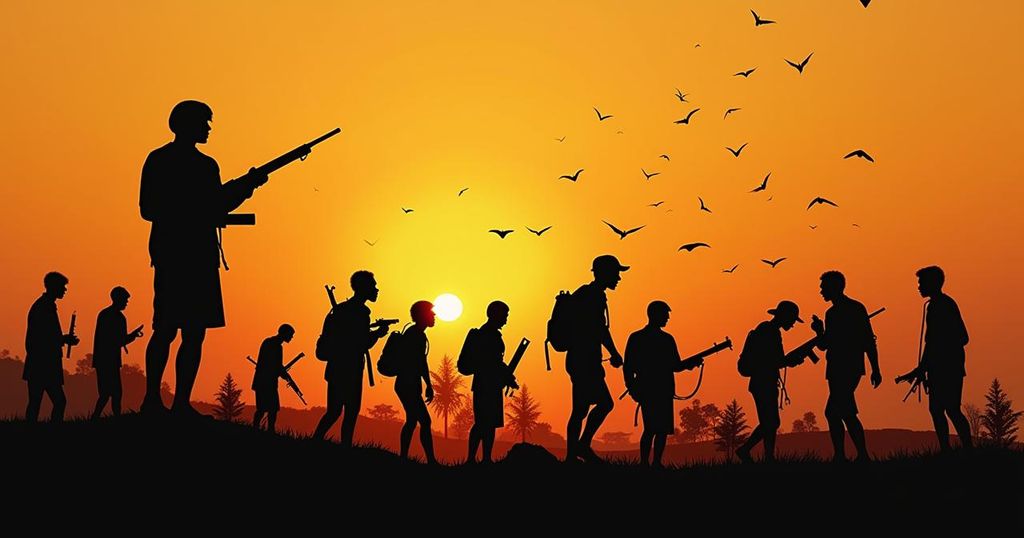Mozambique Prepares for Elections Amidst Insurgency and Drought

Mozambique is preparing for critical elections with approximately 17 million voters set to choose a new president amidst a jihadist insurgency and severe drought-induced hunger. The ruling Frelimo party’s candidate, Daniel Chapo, and his opponents promise to address the urgent security and development issues affecting the nation, all while navigating recent history of electoral fraud and corruption scandals.
Mozambique is preparing to hold crucial elections this week amidst a backdrop of escalating violence from a jihadist insurgency and severe drought-induced food shortages. Approximately 17 million voters will cast their ballots for a new president, along with members of Parliament and provincial assemblies on Wednesday. The incumbent president, Filipe Nyusi, is not eligible to run for re-election after serving two terms. During the six-week campaign period leading to the elections, the leading candidates have promised to address the rampant violence affecting the oil and gas-rich Cabo Delgado province, yet none have proposed concrete plans to resolve the crisis, which has persisted since 2017. The region has been plagued by attacks from an Islamic State-linked group, resulting in considerable loss of life and displacing 1.3 million people, with many returning to devastated communities. Daniel Chapo, the candidate from the ruling Front for the Liberation of Mozambique (Frelimo), has emphasized that restoring peace is essential for infrastructure redevelopment. “The first objective of governance is to work to end terrorism using all available means to return peace. Peace is the condition for development,” declared Chapo during a campaign rally in Pemba. Opposition candidates, such as Lutero Simango from the Democratic Movement of Mozambique and independent candidate Venacio Mondlane, have focused their campaign efforts on promises to improve public health and combat unemployment, while directly addressing the insurgency’s impact. In addition to security concerns, issues of corruption and poverty are pivotal in this election cycle, with many Mozambicans suffering from high unemployment and increasing hunger, exacerbated by El Niño-related droughts. The United Nations World Food Program has indicated that 1.3 million residents are currently facing severe food insecurity. The Frelimo party has faced criticism due to past corruption scandals, including a significant crisis stemming from $2 billion in hidden debts related to dubious fishing industry loans, leading to nationwide economic destabilization. Election monitoring bodies have raised concerns about previous elections marred by fraud and electoral misconduct, prompting the Southern African Development Community to dispatch a delegation of observers. Political analysts suggest that the new president will encounter a complex situation. “The president to be elected will find a very difficult situation because he is in transition during a period of war, and every transition that takes place during a period of war is very difficult,” noted Borges Nhamire, a researcher at the Institute for Security Studies. As Mozambicans prepare to head to the polls, the outcomes will significantly impact the nation’s trajectory amid calls for change and the hope for stability in an increasingly challenging environment.
Mozambique is facing significant challenges that have culminated in its upcoming election. A jihadist insurgency has ravaged the Cabo Delgado province since 2017, leading to insecurity and displacement among the population, which has placed immense pressure on the electoral process. Concurrently, a severe drought, exacerbated by climate phenomena such as El Niño, has resulted in widespread food shortages. This electoral cycle is further complicated by historical issues of governance, corruption, and political discontent, particularly towards the ruling Frelimo party, which has been in power since the country gained independence in 1975.
The elections in Mozambique are poised to be a pivotal event, marked by the urgent need for solutions to the jihadist violence plaguing Cabo Delgado and the pressing issue of food insecurity due to drought. The candidates’ commitments to restoring peace and addressing socio-economic challenges reflect the electorate’s urgent demands for effective governance. As concerns about electoral integrity persist, the results will likely shape Mozambique’s path forward amid increasingly complex national crises.
Original Source: apnews.com








